Part 1 A new beginning - Part
2 Closing down sale - Results and table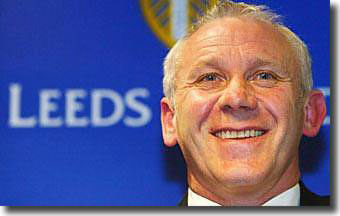
On 21 March 2003, after weeks of speculation, Leeds United terminated
the contract of manager Terry Venables after a disastrous string of results.
Just hours later former Sunderland boss Peter Reid was appointed as caretaker
manager for the remainder of the season, with eight matches left to save
the club.
The Merseysider was delighted with the appointment, which gave him the
opportunity to return to management after being sacked by Sunderland in
October. After great success as a midfielder with the Everton side which
dominated the English game in the mid-80's, also winning the Cup Winners'
Cup, Reid had made an impact as manager with Manchester City and Sunderland,
but a poor run of results at the start of 2002/03 had seen him sacked
by the Wearsiders after just two wins from their first nine matches.
The run in facing Reid looked daunting to say the least. Liverpool away,
Charlton away, Spurs home, Southampton away, Fulham home, Blackburn home,
Arsenal away, Aston Villa home. For a side which had taken just four points
out of a possible 24 since beating Birmingham on New Year's Day it was
hard to see where Leeds United would get the required points. Surely not
from the away games that looked like they had been hand picked to work
against the club?
Reid's first game in charge, on 23 March versus Liverpool at Anfield,
saw a predictable 3-1 defeat with few signs of resurrection.
| |
Bottom of Premiership - 23 March 2003 |
| |
Pos
|
|
P
|
F
|
A
|
Pts
|
| |
13th
|
Fulham |
31
|
35
|
40
|
38
|
| |
14th
|
Aston Villa |
31
|
33
|
37
|
36
|
| |
15th
|
Birmingham City |
31
|
28
|
42
|
35
|
| |
16th
|
Leeds
United |
31
|
38
|
45
|
34
|
| |
17th
|
West
Ham United |
31
|
34
|
53
|
30
|
| |
18th
|
Bolton
Wanderers |
30
|
33
|
47
|
29
|
| |
19th
|
West
Bromwich Albion |
31
|
21
|
47
|
21
|
| |
20th
|
Sunderland |
31
|
19
|
50
|
19
|
| |
|
|
|
|
|
|
West Brom and Sunderland were as good as relegated, but West Ham were
running into a useful spell of form and looked increasingly likely to
overtake Leeds.
There was also more sobering financial news to consider, and as the interim
financial results were released at the end of March, so too came the news
that there was to be a change of chairman. Peter Ridsdale's final job
was to front up the news release, announcing his own departure and welcoming
a new figurehead.
His statement read as follows: 'This has been a very tough six months
for the company and our performance both on and off the pitch has been
unsatisfactory. This means that tough action has had to be taken to generate
funds from player sales and to reduce costs both on and off the pitch.
Although difficult, it is necessary to balance our books to suit our current
position. One outcome of this has been to subject me to significant comment,
and created pressures that are not right for me, my family or the club.
Therefore, after five years as chairman I have decided to step down and
hand over the reins as chairman to Professor John McKenzie who has my
full support.'
The move had not been of Ridsdale's choosing. It was clear that the financial
mismanagement of the preceding few years had made the departure inevitable,
and the chairman had been guilty of 'living the dream', a fan in a businessman's
world, unable to control his desire to buy glory.
The commentary accompanying the interim financial figures outlined the
extraordinary challenges facing the club:
'The figures for the past half-year are disappointing and reflect the
fact that we missed out for the second year running on qualification for
the Champions' League. Having assembled a squad with a cost base that
required regular European football, this has led to a requirement to reduce
overall costs and particularly those of the playing squad. TV revenues
for the UEFA Cup were substantially lower, reflecting the reduced competition
from TV companies for rights to the earlier rounds of this tournament.
'Having made a change of football manager with the appointment of Terry
Venables at the start of the season, results on the field have been extremely
disappointing. This has led to a lower number of live Sky games than we
have experienced previously and a substantial reduction in Sky merit payments
expected for the end of the season. Since the half-year end we took the
decision to make a further change of football manager, with Peter Reid
being appointed for the last eight games of the season.
'For the first time in this country, the transfer window system was introduced
meaning that players could only be bought and sold during two periods
of the year. This new system meant that further opportunities to reduce
player costs were not possible until after the half-year end. During January,
Lee Bowyer, Robbie Fowler and Jonathan Woodgate were sold, with Olivier
Dacourt going to Roma on loan. The impact of these transfers will be reflected
in the second half numbers.
'At the AGM in November, I announced the intention to review both the
executive and non-executive management structure and the non-playing cost
base. This led to the appointment earlier this year of two new non-executive
directors, John McKenzie and Neil Holloway.
'Since becoming Chairman we have mostly had relatively good performances
both on and off the pitch until the current season. This year's results
have therefore been extremely disappointing. In a high-profile role, when
results 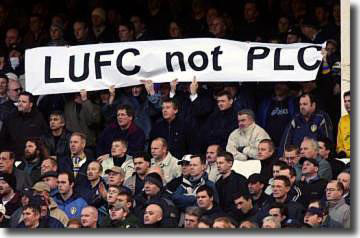 are
not up to expectation levels, you rightly expect criticism. This comes
with the territory. When this criticism becomes so intense that it affects
your family and health, it requires clear reflection on the right way
forward. The intensity of personal criticism has led me to conclude that
the best decision for myself, my family and the company is that I step
down as Chairman of the plc and football club and relinquish all executive
responsibilities. This I am doing today.'
are
not up to expectation levels, you rightly expect criticism. This comes
with the territory. When this criticism becomes so intense that it affects
your family and health, it requires clear reflection on the right way
forward. The intensity of personal criticism has led me to conclude that
the best decision for myself, my family and the company is that I step
down as Chairman of the plc and football club and relinquish all executive
responsibilities. This I am doing today.'
back to top
The outstanding long-term debt was the figure upon which most attention
was focused. Net debt at 31 December 2002 had soared to an incredible
£78.9m. £30m had been raised in cash from the sales of Ferdinand and Keane,
but the club had still to find £16.9m as further instalments on Fowler,
Johnson, Keane and Barmby had become due. Further clues as to the lack
of financial stewardship came in a popular anecdote about Johnson's signing.
When the midfield player moved from Derby County, he had been hoping
for a weekly salary of £15,000. The initial Leeds offer was £30,000. At
the news Johnson sat back in his chair in delight. The reaction was misinterpreted,
and the response was, 'Okay, £35,000, and that's your lot …'
The combination of O'Leary's ambition and Ridsdale's profligacy had taken
the club to the verge of bankruptcy and the impact would be felt for years
to come.
Professor John McKenzie was an interesting choice to succeed Publicity
Pete. The club website offered the following resume: 'The new Leeds United
chairman, Professor John McKenzie was born in Ilford, Essex. The 65-year-old
comes from a family background that has long been involved in football,
his father was DW McKenzie, a member of the FA international committee
and president of the Isthmian League.
'His involvement with Leeds United began during that time when he became
a season ticket holder and has been a regular supporter ever since. He
later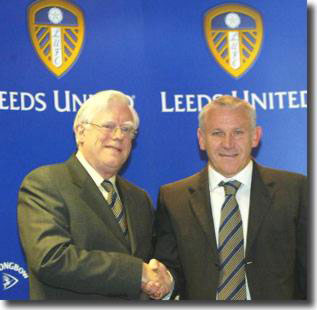 went on to invest in the club, gradually building up his shareholding
until he became the second largest individual shareholder with some four
million shares. He was invited to join the Football Club board in October,
and joined the plc board as a non-executive director six weeks ago.
went on to invest in the club, gradually building up his shareholding
until he became the second largest individual shareholder with some four
million shares. He was invited to join the Football Club board in October,
and joined the plc board as a non-executive director six weeks ago.
'An Economist by training, he graduated from the London School of Economics
and gained a BSc from the University College of London, Bedford. In 1986
he was made rector of the London Institute and is currently director of
international development. He was also head of Liverpool Polytechnic during
the height of the Hatton crisis. His professional career has seen him
take up senior positions with a number of FTSE 100 blue chip companies
including Cadbury's Schweppes, Unilever and SmithKline Beechams. He is
also currently a special advisor to the Shanghai Municipal Government,
the Tokyo cultural institute, Sarawak University in Malaysia and has a
long standing interest in the Far East.'
There were notable differences between McKenzie and his predecessor,
as The Times pointed out: 'Many would say that Ridsdale, who had
been dubbed Publicity Pete, was too high-profile. His over-exuberance,
agreeing to gamble the future of the club on the hope of Champions' League
qualification, led to his eventual downfall. McKenzie, already media-shy,
yesterday hinted as much. "I am not Peter Ridsdale in disguise,"
he said. "We are adopting a procedure much closer to that of Manchester
United and Arsenal, where the chairman of the plc is not a high-profile
figure."'
McKenzie's initial comments were realistic but positive: 'It is serious
but not impossible. The fact that the city institutions have endorsed
my appointment gives me a very good starting base, and Peter had already
begun something of a financial turnaround of the situation with some of
the decisions made earlier. In any way breaking up the squad would be
a final resort situation, I would want to see us try to find ways of increasing
our income in all sorts of ways and control our costs, but you can't be
a fine football club without a fine squad of players.
'We had hoped with the squad we have to be significantly up the table
and not on the fringe of relegation. I hope that as a club we will become
cohesive, fans, employees, team and manager together to take us back to
where we rightly ought to be. In terms of the plc then clearly we have
to review our strategy and look at ways of increasing our finances 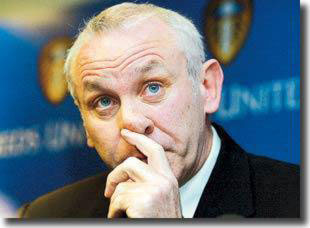 and
bring our debt down, but hopefully not at the cost of damaging our football
team.
and
bring our debt down, but hopefully not at the cost of damaging our football
team.
'You can't just cut away at the business and lose the quality which that
business has or else you lose everything. So we must ensure we have as
good a squad as possible and we build around that and we build financially.
When we move forward we will do everything we can to generate income and
restrict to a minimum the sale of players. Players come and go for different
reasons, sometimes they want to go, sometimes the manager has a view that's
different. I would regard it as a real disappointment if we had to go
much beyond losses other than for those two reasons.
'If the club went on haemorrhaging money at the current rate there would
be a material problem, but we are not going to keep losing money at that
rate. Already steps have been announced by my predecessor and it has been
clear for some time that change has begun and clearly over the coming
months more has to be done. You don't have to be a great expert to say
that you can't afford to keep losing £17m in half a year unless you have
a multi-millionaire behind you and prosper.
'You can't begin to see major impact of any changes in half a year, although
Peter had already put in place certain changes, clearly there are some
refinancing issues we may be able to undertake during the period, but
I'm not in this for a short term, expedient, two doses of antibiotics
and you're fit again kind of fix - this will take some time.'
It sounded upbeat enough, and gave desperate fans some reason to hope,
but in the meantime, Peter Reid had a desperate battle against relegation
on his hands and the trip to Charlton on 5 April did not offer much comfort
with Alan Curbishley's South London outfit handily placed at seventh in
the table.
Astonishingly, however, it was exactly as things seemed at their most
desperate that the Leeds players at last found some decent form. Inspired
by the hard running and aggressive performance of Alan Smith up front,
the Aussie duo of Harry Kewell and Mark Viduka caught fire, snaffling
five goals between them, with Ian Harte getting the other in a
breathtaking 6-1 away win. The performance was as mysterious as it
was impressive. If they could play like this, wondered the pundits, why
had the team struggled all season, and why could Reid coax a performance
out of them when Terry Venables could not.
back to top
The win took them six points clear of relegation, and into 14th position
with just six matches left, prompting Sky TV to claim, 'As well as surely
securing their Premiership status, the win will help Reid's claims for
a permanent post and showed that, as he has insisted all along - and most
of football suspected - Leeds are too good to go down.'
However, the next couple of weeks brought a fortunate 2-2 draw at home
to Tottenham, and then a dire 3-2 reverse at Southampton, with two late
consolation goals giving the score a respectable ring, while Alan Smith
suffered the ninth red card of his short career. Peter Reid was as disappointed
as he had been elated by the triumph at Charlton, moaning: 'They got out-fought,
outworked, outbattled, outpassed, outscored, out-everything. I can't protect
that performance. I don't want to. I might be here for just a short time,
but those players have got long contracts and they've got to get their
fingers out. The league table doesn't lie - look where they are. The chairman
doesn't make tackles, the players do. I wish the chairman did make tackles
- he might have won a few.'
Happily Leeds United still had six points advantage on West Ham, who
were occupying the final relegation spot. The gap was mainly thanks to
Bolton beating the Hammers that same day with the only goal of the game.
| |
Bottom of Premiership - 19 April 2003 |
| |
Pos
|
|
P
|
F
|
A
|
Pts
|
| |
13th
|
Aston Villa |
34
|
38
|
41
|
41
|
| |
14th
|
Fulham |
34
|
37
|
47
|
41
|
| |
15th
|
Birmingham City |
34
|
33
|
44
|
41
|
| |
16th
|
Leeds
United |
34
|
48
|
51
|
38
|
| |
17th
|
Bolton
Wanderers |
34
|
37
|
48
|
38
|
| |
18th
|
West
Ham United |
34
|
37
|
57
|
32
|
| |
19th
|
West
Bromwich Albion |
34
|
24
|
53
|
24
|
| |
20th
|
Sunderland |
34
|
21
|
56
|
19
|
With West Brom and Sunderland now formally doomed to demotion, the fight
for relegation came down to just three clubs, Leeds, Bolton and West Ham.
United's rivals were both enjoying a run of results which a woefully inconsistent
Elland Road side could only dream about.
On Easter Monday, 21 April, while Leeds rested, Birmingham beat FA Cup
finalists Southampton, and Aston Villa and Bolton gained draws at Newcastle
and Blackburn -West Ham gained ground with a 1-0 home win over Middlesbrough.
The Hammers were now just three points behind Leeds and hot on their heels.
Again, however, Mark Viduka brought home the bacon, netting both goals
in a 2-0 home win over Fulham the next day, to once again give his side
a six point cushion.
The Times: 'The club may be more than £70m in the red, but Leeds
United took on another debt last night and this time it was one that they
were more than happy to accommodate. If they are to survive relegation
after one of the most traumatic seasons in their history, it is to Mark
Viduka that they will owe considerable gratitude. The Australia forward
took his tally in the past seven Barclaycard Premiership matches to 11
goals with the double that accounted for Fulham at Elland Road and lifted
Leeds above the London side to the comparative safety of fifteenth place,
six points clear of West Ham United. Both Leeds and 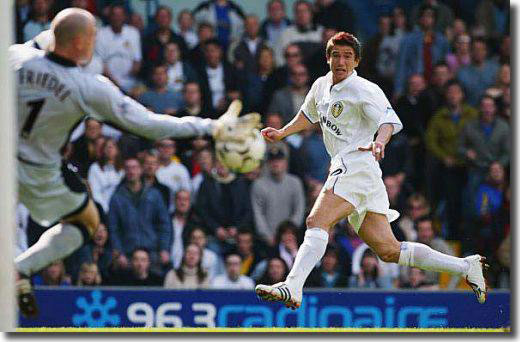 Fulham
need four more points to be mathematically safe from the drop, but on
the evidence of last night's one-sided affair it is Fulham who will be
fretting most.
Fulham
need four more points to be mathematically safe from the drop, but on
the evidence of last night's one-sided affair it is Fulham who will be
fretting most.
'This victory owed as much to Leeds's superior hunger and desire as it
did to Viduka's cool-headed finishing. Leeds never allowed their opponents
to settle and Reid appreciated the effort put in for the fifth of his
eight matches in charge. "This is a big result and the players deserve
all the credit,' Reid said, 'but we must keep working hard because other
teams around us keep picking up points as well."'
The relegation pendulum swung dramatically against Leeds the following
weekend, with a desperate 3-2 defeat at home to Blackburn. The Times:
'Viduka's twentieth goal this season should have been the foundation for
a win that would have put safety beyond reasonable doubt, but Michael
Duberry's senseless handball allowed David Dunn to equalise from the penalty
spot. Andrew Cole, relishing hostilities with Danny Mills and Dominic
Matteo, forged Blackburn ahead in the 68th minute and Andy Todd applied
a finishing side-foot volley after Paul Robinson had misjudged Damien
Duff's corner ten minutes later. Alan Smith's headed goal in injury time
was meaningless.'
Bolton pulled out a last gasp equaliser at home to gain a point against
championship contenders Arsenal and leave themselves just a point shy
of Leeds. The next day West Ham earned all three points with the only
goal away to Manchester City to leave everything still in the melting
point.
Leeds' final two games comprised a visit to Arsenal and a home match
with Villa. While the Birmingham side looked relatively easy meat, the
Gunners were the equivalent of Everest to a Leeds side whose nerves were
clearly jangling.
The Arsenal match was fixed for Sunday, 4 May, giving Bolton and West
Ham the chance to draw first blood on the Saturday. West Ham were first
to kick off, at home to Chelsea. Caretaker Hammers manager Trevor Brooking,
covering for the indisposed Glenn Roeder, brought the disaffected Italian
Paulo Di Canio back into his squad. The game was petering out to a goalless
draw when Brooking threw his last dice and ordered Di Canio off the subs'
bench. The headline writers had a field day as the temperamental Italian
broke the stalemate with only minutes to go, allowing West Ham to draw
level on points with Leeds.
| |
Bottom of Premiership - 26 April 2003 |
| |
Pos
|
|
P
|
F
|
A
|
Pts
|
| |
14th
|
Aston Villa |
36
|
40
|
44
|
42
|
| |
15th
|
Fulham |
36
|
38
|
50
|
42
|
| |
16th
|
Leeds
United |
36
|
52
|
54
|
41
|
| |
17th
|
Bolton
Wanderers |
36
|
39
|
50
|
40
|
| |
18th
|
West
Ham United |
36
|
39
|
57
|
38
|
| |
19th
|
West
Bromwich Albion |
36
|
26
|
62
|
24
|
| |
20th
|
Sunderland |
36
|
21
|
60
|
19
|
A teatime kick off allowed Bolton the luxury of knowing what they needed
to achieve away to Southampton, and they held out for a goalless draw,
allowing them to also draw level on 41 points.
It was now clear that even a draw for Leeds at Highbury would be of little
benefit and would see them needing a last day win to be safe. Goal difference
was massively in Leeds' favour, but tension was eating away at a club
whose very future was in question.
Peter Reid, who had faced similar battles at other clubs, issued the
clarion call: 'It's going to be very difficult, but it's still in our
own hands and we've got to make sure we do our bit. It's all about having
the ability to handle the situation physically and mentally. I've been
in it before and seen both sides, so I know what's needed. We have to
be brave, brave to make tackles and brave to make our passes. There is
no place to hide.
'Right now the only message I'm drumming into the players is to stop
giving away silly goals because individual errors keep costing us. When
there is a threat on our goal it's got to be safety first every time.
We've got to make sure that in our last two games we are hard to beat.
We cannot afford to give away silly goals like we did against Blackburn.
'People talk about pressure and having bottle in football. This is what
it's all about. We never expected to be in this position, but West Ham
have done terrifically well. For the players here, this match now is as
big as any of the Champions League ties they played. We need to win to
stay in this League. I like to think we've got enough players who can
rise to the big occasion, and I certainly expect them to do it.'
Reid prayed that the Leeds side turning up at Highbury would be the team
that had thrashed Charlton, rather than the meek losers who capitulated
at Southampton. He had his answer after just four minutes, when Harry
Kewell brought down a long ball and hit it first time from the left flank
to net an unstoppable effort.
Thierry Henry equalised after half an hour, but Leeds were fighting like
men possessed. Ian Harte scored for the third successive season in the
fixture, with a characteristic free kick three minutes into the second
half. Again Arsenal fought back on the hour, and Dennis Bergkamp was on
hand to sidefoot home after Robert Pires played him in after a break from
the left.
It looked like Leeds would settle for a well deserved draw, but with
just two minutes remaining, the Elland Road club's moment of the season
arrived. Skipper Dominic Matteo, who had been outstanding in an unaccustomed
midfield role, broke up the play near the centre circle and lofted a long
ball up to Mark Viduka on the right. There were suspicions of offside,
but Viduka did not hesitate, controlled the ball instantly, cut in on
his left, took aim and curled a brilliant winner round England keeper
David Seaman to spark unbelievable celebrations in the Leeds camp.
It was an amazing triumph, and
few would deny that Leeds merited the win. Certainly Manchester United,
who were thus presented with the Premiership title, were for once 100%
behind their despised Yorkshire rivals.
For Leeds, however, Old Trafford's gain was the last thing on their minds
as their survival was ensured, and the home match with Villa became nothing
more than a formality to be endured before they could enjoy a summer of
rest.
The doom mongers reminded everyone that the club's financial state meant
that in reality all their players were in the transfer window, but for
now at least Peter Reid cared not. Five days after the Arsenal game his
appointment was confirmed on a rolling, one-year incentive-based contract.
'Obviously I was brought in to do a specific job and thankfully that
was achieved,' he said, at a press conference on Friday, 9 May. 'Fortunately
for myself I have managed to get the job on a permanent basis. When you
are manager of a club like Leeds, with its traditions, you know what the
bottom line is; you have to win football matches.
'When you get beaten in 19 games, that is not good enough and we have
to improve, first become a hard side to beat and then improve the football.
It's hard in the Premiership but we have got some really good players
here and, hopefully with the wheeling and dealing in the summer, we can
get some more good ones in.'
Two days later, Leeds ended their season with a 3-1 win at home to Aston
Villa to finish above the Midlanders in a final 15th position. The win
was fortunate and achieved despite a lacklustre display, but few at Elland
Road cared. The club's worst season for many a year was finally over,
and despite all the newspaper headlines and criticism, they could look
forward to a 14th successive season in the top
flight.
Part 1 A new beginning - Part
2 Closing down sale - Results and table
back to top













 are
not up to expectation levels, you rightly expect criticism. This comes
with the territory. When this criticism becomes so intense that it affects
your family and health, it requires clear reflection on the right way
forward. The intensity of personal criticism has led me to conclude that
the best decision for myself, my family and the company is that I step
down as Chairman of the plc and football club and relinquish all executive
responsibilities. This I am doing today.'
are
not up to expectation levels, you rightly expect criticism. This comes
with the territory. When this criticism becomes so intense that it affects
your family and health, it requires clear reflection on the right way
forward. The intensity of personal criticism has led me to conclude that
the best decision for myself, my family and the company is that I step
down as Chairman of the plc and football club and relinquish all executive
responsibilities. This I am doing today.' went on to invest in the club, gradually building up his shareholding
until he became the second largest individual shareholder with some four
million shares. He was invited to join the Football Club board in October,
and joined the plc board as a non-executive director six weeks ago.
went on to invest in the club, gradually building up his shareholding
until he became the second largest individual shareholder with some four
million shares. He was invited to join the Football Club board in October,
and joined the plc board as a non-executive director six weeks ago. and
bring our debt down, but hopefully not at the cost of damaging our football
team.
and
bring our debt down, but hopefully not at the cost of damaging our football
team. Fulham
need four more points to be mathematically safe from the drop, but on
the evidence of last night's one-sided affair it is Fulham who will be
fretting most.
Fulham
need four more points to be mathematically safe from the drop, but on
the evidence of last night's one-sided affair it is Fulham who will be
fretting most.